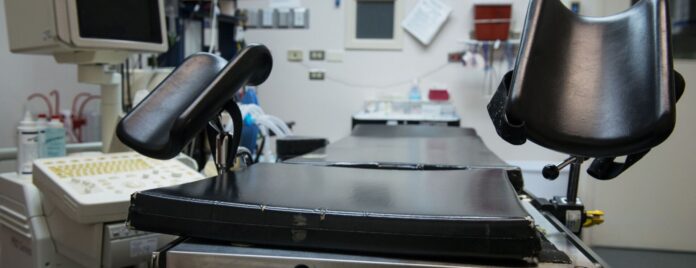The impending closure of one of two remaining Wyoming abortion clinics highlights the increasing financial and logistical pressure providers face in the post-Dobbs era, policy analysts and abortion rights groups say.
The Women’s Health & Family Care clinic in Jackson is planning to close its doors Dec. 15 after more than 30 years in the community, due to the “rising cost of overhead, including rent, labor, and supplies,” according to a letter sent to the clinic’s patients. The only other physical clinic in Wyoming offering procedural and medication abortion—Wellspring Health Access in Casper—is more than four hours away by car.
As abortion clinics close, policy analysts and reproductive health-care groups warn state bans and other restrictions are exacerbating insurance and security costs that have long plagued abortion providers, leaving a vastly uneven distribution of reproductive health care across the country
.
At least 66 clinics across 15 states stopped offering abortions within 100 days of the June 2022 Supreme Court ruling in Dobbs v. Jackson Women’s Health Organization, according to the Guttmacher Institute. updated data on the issue are limited, and don’t provide a clear picture of the total number of clinics that have either stopped offering abortion or completely closed more than a year later
.
“Anytime a clinic closes, it’s a real loss for the community,” said Melissa Fowler, chief program officer for the National Abortion Federation, which represents US abortion providers.
“Some have closed completely, some have pivoted to providing other services and are still open, and some have had to close their clinics but have been able to reopen in another state where abortion has remained legal,” Fowler said.
Abortion in Wyoming
While abortion is legal in Wyoming until the point of fetal viability—roughly 24 weeks—state bans on the procedure and abortion medication are currently tied up in a court battle. On top of this, patients from surrounding states like Idaho and South Dakota that have near-total bans have traveled to Wyoming to receive abortion care. For patients, “that adds time and cost and potentially delays when there’s no clinic serving in a very large territory,” said Usha Ranji, associate director for women’s health policy at KFF.
Each of the four Jackson clinic OB-GYNs are planning to continue practicing in the community, according to their letter to patients. It’s unclear whether they will offer abortion services at their new practice locations. Jackson providers and other clinic staff didn’t respond to multiple requests for comment.
Wellspring, which opened earlier this year after an arson attack in 2022 delayed its start date, is preparing for a potential influx of new patients to its facility by expanding telehealth services, clinic spokesperson Lauren Rankin said in an interview. In addition to providing procedural and medication abortion, the clinic also offers services like family planning and emergency contraception.
But the cost of remaining open is a concern, Rankin said, since the clinic is involved in the lawsuit challenging abortion bans currently on hold in the state. Giovannina Anthony, one of the providers in Jackson, is also a plaintiff in the case, Johnson v. State of Wyoming, which is pending in the District Court of Teton County in Wyoming’s Ninth Judicial Circuit.
On Dec. 14, Wyoming state district court Judge Melissa Owens will hear oral arguments on whether to issue a summary judgment on the bans. The abortion providers argue Owens should permanently strike the bans down, while state officials say the laws comply with the state’s constitution.
If Owens rules in favor of the bans, the providers plan to appeal and “exhaust every legal avenue we can to keep abortion legal in the state,” Rankin said.
Neverthelesse, Wellspring is “dedicated to ensuring that we can remain open and provide the care that people need as long as we can,” Rankin said.
Counting Costs
Clinics in Wyoming and other states across the country have long faced elevated operating costs and insurance coverage restrictions, making it difficult for many to stay afloat, Fowler said.
Before the Dobbs decision, the American College of Obstetricians and Gynecologists in 2017 projected that by 2050, there could be a shortage of 22,000 OB-GYNs across the country, with a disproportionate impact on rural areas.
During the Covid-19 pandemic, abortion providers, like other health professionals, had to adjust to a new normal of providing care. On top of that, “abortion providers also have to deal with the very real security concerns that, unfortunately, come along because of the work that they do,” Fowler said.
“They have to think about the costs related to that security from the very start, because they are so often harassed and targeted by anti-abortion individuals and groups,” Fowler said. In May, NAF reported spikes between 2021 and 2022 in incidents of stalking, burglary, arson, and other violence against abortion providers and clinics.
OB-GYNs also have some of the highest medical malpractice insurance rates, due to the risks associated with birth and delivery. The American Medical Association reported an increase in medical liability premiums in 2022 for the fourth year in a row.
Additionally, 32 states and the District of Columbia follow the Hyde Amendment, which prohibits the use of federal funds for joint federal-state Medicaid programs to cover abortions except in cases of life endangerment, rape, or incest.
In conclusion, providers are seeing the impact of state abortion bans modify the quality of care available for patients and the practices of providers.
